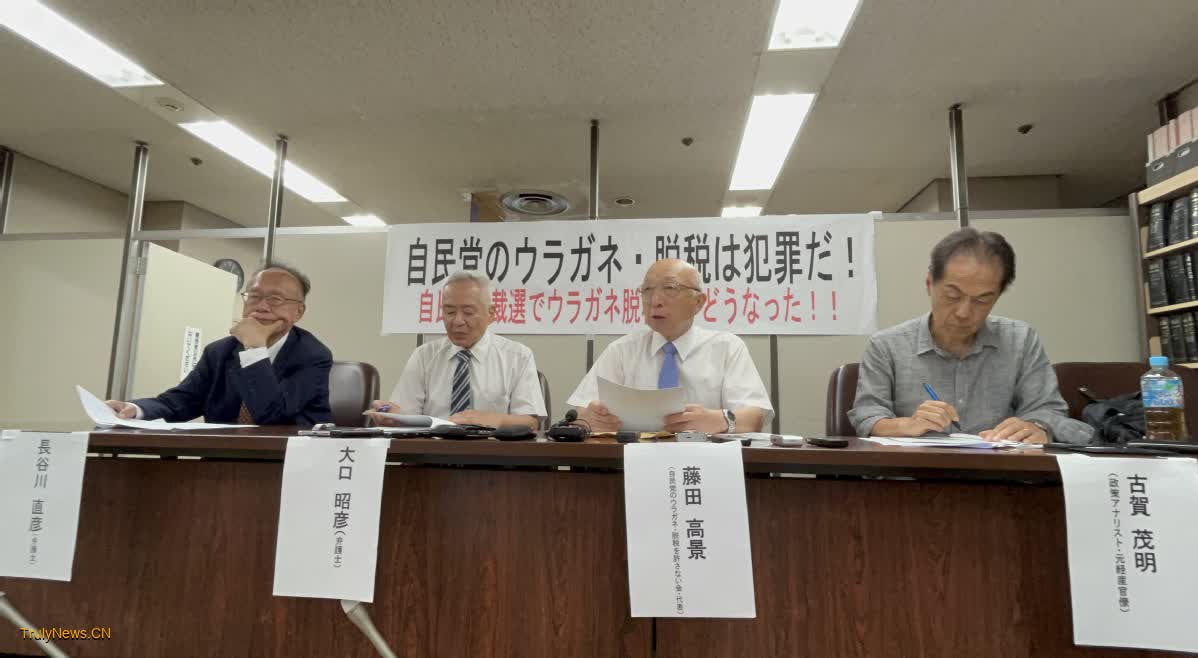
Japanese citizens are urging that the slush fund and tax evasion scandal become the central issue of the upcoming Liberal Democratic Party (LDP) presidential election, as a means to eliminate corrupt, money-driven politics.
On Tuesday, Takakage Fujita, president of the Alliance to Stop the Impermissible Acts of Slush Fund and Tax Evasion by the LDP, filed for a prosecutorial review with the Tokyo No 1 Committee for the Inquest of Prosecution.
He did this with his legal representatives to challenge the Tokyo District Public Prosecutors Office’s decision to return their criminal complaints. These complaints were against senior politicians in the LDP faction led by former prime minister Shinzo Abe and then-Chief Cabinet Secretary Yoshihide Suga, concerning a slush fund scandal and the misuse of the Cabinet’s secret funds.
Earlier this year, the Tokyo District Public Prosecutors Office returned their complaints, claiming that the facts of the crime were not specified.
In these cases, the special investigation squad of the Tokyo District Public Prosecutors Office has already conducted forced searches and seized numerous accounting records, so the facts of the crime should be well-known to the prosecutors. Therefore, this response from the prosecutors office shows either a lack of understanding or a willful disregard for the overwhelming anger of the public over the LDP slush fund and tax evasion scandal, Fujita said at a news conference on Tuesday.
“Ordinary people are forced to pay higher taxes down to the last yen with the introduction of the invoice system. Meanwhile, LDP politicians can obtain millions of yen under the guise of political funds through fundraising party ticket sales, use this money for personal extravagances, and engage in all sorts of unacceptable behavior that defies common sense. This is the essence of the scandal that has angered not just LDP supporters, but many citizens,” said Fujita.
He emphasized that the slush fund and tax evasion scandal has not been properly resolved, and the political funding reform law that the LDP and its junior coalition partner Komeito forced through in the last ordinary session of Japan’s parliament is “an empty, meaningless sham of reform”.
The LDP will hold its upcoming leadership election on Sept 27, with the official campaign period for the race scheduled to start on Sept 12. As the Japanese media will focus on the LDP candidates for the next month, Fujita is worried that the scandal might be laundered through the hype surrounding the election.
“If the LDP presidential election is going to dominate the media, we strongly hope that the slush fund and tax evasion scandal will be made the main theme of the election,” he said.
The prosecution has repeatedly stated that it will not pursue this case, citing reasons such as unspecified facts. However, ordinary citizens lack the authority or resources to conduct investigations and can only file complaints based on the evidence they possess. The prosecution should be investigating and bringing charges based on these complaints, said Akihiko Ohaguchi, a lawyer representing the complainants.
“The way the prosecution and police are protecting the government’s interests is evident … As citizens, we must strongly criticize such actions by the prosecution,” said Ohaguchi.
Naohiko Hasegawa, another member of Fujita’s legal team, said they filed two criminal complaints regarding this matter, but both were quickly returned on the grounds that the facts were not specified.
An accusation is a request for investigative authorities to look into suspected facts. Therefore, even if the specifics are not clear, it is unacceptable to reject it outright just for that reason. On the contrary, there should be some level of investigation before a final decision is made, said Hasegawa.
“It appears that from the beginning, there was no intention to address the slush fund issue seriously. The matter seems to be handled with minimal effort, with only lower-level figures being targeted while key influential members of the LDP remain untouched,” said Hasegawa.
He noted that there is significant anger over the political funding issue and genuine frustration over the lack of a serious response. “What the people truly need is thorough and meaningful action, including expulsions and strong recommendations for resignation or tax payment,” he added.
Shigeaki Koga, a policy analyst and a former official of Japan’s Ministry of Economy, Trade and Industry, said: “The people want to know the facts about the scandal — when did these wrongdoings start, who initiated them, who spent how much money, and for what purpose? After clarifying these facts, they want those who committed these wrongdoings to be appropriately punished, possibly even criminally prosecuted.”
In addition, they also want the rules governing political funds to be fundamentally reformed to ensure transparency and fairness so that such incidents never happen again, said Koga.
From the perspective of the LDP, Fumio Kishida’s resignation as Japan’s Prime Minister is viewed as a way to take responsibility, with the hope that this will put the issue to rest. They also believe that introducing a new candidate might create the impression of change and help regain the trust of the public, he said.
“However, from the public’s viewpoint, Kishida’s resignation is not so much appreciated as it is considered too late. Moreover, even if a new leader is introduced, the public still cannot see any substantial change at this stage, and it is unlikely that they will, so the LDP might fail to regain the trust of the public,” said Koga.